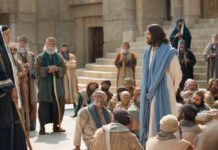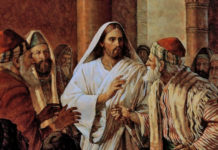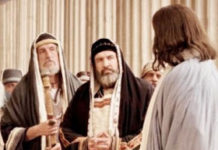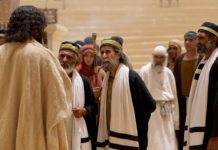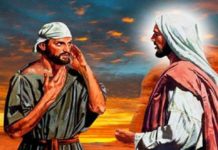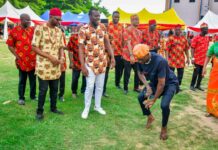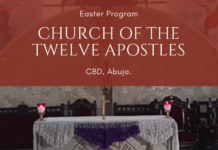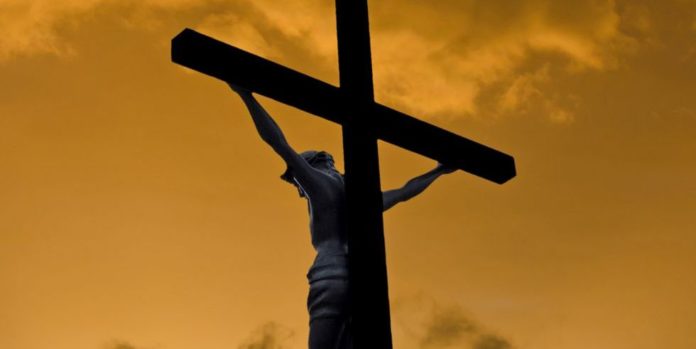FIRST READING
“He was wounded for our transgressions.” Fourth song of the Servant of the Lord
A reading from the Book of Isaiah (Isaiah 52: 13-53: 12)
Behold, my servant shall prosper, he shall be exalted and lifted up, and shall be very high. As many were astonished at him his appearance was so marred, beyond human semblance, and his form beyond that of the sons of men — so shall he startle many nations; kings shall shut their mouths because of him; for that which has not been told them they shall see, and that which they have not heard they shall understand. Who has believed what we have heard? And to whom has the arm of the Lord been revealed? For he grew up before him like a young plant, and like a root out of dry ground; he had no form or comeliness that we should look at him, and no beauty that we should desire him. He was despised and rejected by men; a man of sorrows, and acquainted with grief; and as one from whom men hide their faces he was despised, and we esteemed him not. Surely he has borne our grief and carried our sorrows; yet we esteemed him stricken, struck down by God, and afflicted. But he was wounded for our transgressions, he was bruised for our iniquities; upon him was the chastisement that made us whole, and with his stripes we are healed. All we like sheep have gone astray; we have turned every one to his own way; and the Lord has laid on him the iniquity of us all. He was oppressed, and he was afflicted, yet he opened not his mouth; like a lamb that is led to the slaughter, and like a sheep that before its shearers is silent, so he opened not his mouth. By oppression and judgement he was taken away; and as for his generation, who considered that he was cut off out of the land of the living, stricken for the transgression of my people? And they made his grave with the wicked and with a rich man in his death, although he had done no violence, and there was no deceit in his mouth. Yet it was the will of the Lord to bruise him; he has put him to grief; when he makes himself an offering for sin, he shall see his offspring, he shall prolong his days; the will of the Lord shall prosper in his hand; he shall see the fruit of the travail of his soul and be satisfied; by his knowledge shall the righteous one, my servant, make many to be accounted righteous and he shall bear their iniquities. Therefore I will divide him a portion with the great, and he shall divide the spoil with the strong; because he poured out his soul to death, and was numbered with the transgressors; yet he bore the sin of many, and made intercession for the transgressors.
The word of the Lord.
RESPONSORIAL PSALM Psalm 31:2 and 6.12-13.15- 16.17 and 25 (R. Lk 23:46b)
R/. Father, into your hands I commit my spirit!
In you, O Lord, I take refuge.
Let me never be put to shame.
In your justice, set me free.
Into your hands I commend my spirit.
You will redeem me, O Lord, O faithful God. R.
Because of all my foes
I have become a reproach,
an object of scorn to my neighbours
and of fear to my friends.
Those who see me in the street flee from me.
I am forgotten, like someone dead,
and have become like a broken vessel. R.
But as for me, I trust in you, O Lord;
I say, “You are my God.
My lot is in your hands, deliver me
from the hands of my enemies and those who pursue me.” R.
“Let your face shine on your servant.
Save me in your merciful love.”
Be strong, let your heart take courage,
all who hope in the Lord. R.
SECOND READING
“He learned obedience and became the source of eternal salvation to all who obey him.”
A reading from the Letter to the Hebrews (Hebrews 4: 14-16; 5 :7-9)
Brethren: Since we have a great high priest who has passed through the heavens, Jesus, the Son of God, let us hold fast our confession. For we have not a high priest who is unable to sympathise with our weaknesses, but one who in every respect has been tempted as we are, yet without sinning. Let us then with confidence draw near to the throne of grace, that we may receive mercy and find grace to help in time of need. In the days of his flesh, Jesus offered up prayers and supplications, with loud cries and tears, to him who was able to save him from death, and he was heard for his godly fear. Although he was a Son, he learned obedience through what he suffered; and being made perfect he became the source of eternal salvation to all who obey him.
The word of the Lord.
VERSE BEFORE THE GOSPEL Philippians 2:8b.9
Glory and praise to you, O Christ. Christ became obedient for us unto death, even death on a cross. Therefore God has highly exalted him and bestowed on him the name which is above every name. Glory and praise to you, O Christ.
GOSPEL
The Passion of our Lord Jesus Christ according to John (John 18: I-19:42)
In the following Passion narrative: N. = narrator, + = Christ, S. = speakers other than Christ.
N. At that time: Jesus went forth with his disciples across the Kidron valley, where there was a garden, which he and his disciples entered. Now Judas, who betrayed him, also knew the place; for Jesus often met there with his disciples. So Judas, procuring a band of soldiers and some officers from the chief priests and the Pharisees, went there with lanterns and torches and weapons. Then Jesus, knowing all that was to befall him, came forward and said to them.
C. “Whom do you seek?”
N They answered him,
S “Jesus of Nazareth.”
N. Jesus said to them,
C. “I am he.”
N. Judas, who betrayed him, was standing with them. When he said to them, “I am he,” they drew back and fell to the ground. Again he asked them,
C. “Whom do you seek?”
N. And they said,
S. “Jesus of Nazareth.”
N. Jesus answered,
C. “I told you that I am he; so if you seek me, let these men go.”
N. This was to fulfil the word which he had spoken, “Of those whom you gave me I lost not one.” Then Simon Peter, having a sword, drew it and struck the high priest’s slave and cut off his right ear. The slave’s name was Malchus. Jesus said to Peter,
C. “Put your sword into its sheath; shall I not drink the chalice which the Father has given me?”
N. So the band of soldiers and their captain and the officers of the Jews seized Jesus and bound him. First they led him to Annas; for he was the father-in-law of Caiaphas, who was high priest that year. It was Caiaphas who had given counsel to the Jew that it was expedient that one man should die for the people. Simon Peter followed Jesus, and so did another disciple. As this disciple was known to the high priest, he entered the court of the high priest along with Jesus, while Peter stood outside at the door. So the other disciple, who was known to the high priest, went out and spoke to the maid who kept the door, and brought Peter in. The maid who kept the door said to Peter,
N. “Are not you also one of this man’s disciples?” He said,
S. “I am not.”
N. Now the servants and officers had made a charcoal fire, because it was cold, and they were standing and warming themselves; Peter also was with them, standing and warming himself. The high priest then questioned Jesus about his disciples and his teaching. Jesus answered him,
C. “I have spoken openly to the world; I have always taught in synagogues and in the temple, where all Jews come together; I have said nothing secretly. Why do you ask me? Ask those who have heard me, what I said to them; they know what I said.”
N. When he had said this, one of the officers standing by struck Jesus with his hand, saying,
S. “Is that how you answer the high priest?”
N. Jesus answered him,
C. “If I have spoken wrongly, bear witness to the wrong; but if I have spoken rightly, why do you strike me?”
N. Annas then sent him bound to Caiaphas the high priest. Now Simon Peter was standing and warming himself. They said to him,
S. “Are not you also one of his disciples?”
N. He denied it and said,
S. “I am not.”
N. One of the servants of the high priest, a kinsman of the man whose ear Peter had cut off, asked,
S. “Did I not see you in the garden with him?”
N. Peter again denied it; and at once the cock crowed.
Then they led Jesus from the house of Caiaphas to the praetorium. It was early. They themselves did not enter the praetorium, so that they might not be defiled, but might eat the Passover. So Pilate went out to them and said;
S. “What accusation do you bring against this man?”
N. They answered him,
S. “If this man were not an evildoer, we would not have handed him over.”
N. Pilate said to them,
S. “Take him yourselves and judge him by your own law.”
N. The Jews said to him,
S. “It is not lawful for us to put any man to death.”
N. This was to fulfil the word which Jesus had spoken to show by what death he was to die. Pilate entered the praetorium again and called Jesus, and said to him,
S. “Are you the King of the Jews?”
N. Jesus answered,
C. “Do you say this of your own accord, or did others say it to you about me?”
N Pilate answered,
S. “Am I a Jew? Your own nation and the chief priests have handed you over to me; what have you done?”
N. Jesus answered,
C. “My kingship is not of this world; if my kingship were of this world, my servants would fight, that I might not be handed over to the Jews; but my kingship is not from the world.”
N. Pilate said to him,
S. “So you are a king?”
N. Jesus answered,
C. “You say that I am a king. For this I was born, and for this I have come into the world, to bear witness to the truth. Everyone who is of the truth hears my voice.”
N. Pilate said to him,
S. “What is truth?”
N. After he had said this, he went out to the Jews again, and told them,
S. “I find no crime in him. But you have a custom that I should release one wan for you at the Passover; will you have me release for you the King of the Jews?”
N. They cried out again,
S. “Not this man, but Barabbas!
N. Now Barabbas was a robber.
Then Pilate took Jesus and scourged him. And the soldiers plaited a crown of thorns, and put it on his head, and clothed him in a purple robe; they came up to him, saying,
S. “Hail, King of the Jews !”
N. and struck him with their hands. Pilate went out again, and said to them,
S. “Behold, I am bringing him out to you, that you may know that I find no crime in him.”
N. So Jesus came out, wearing the crown of thorns and the purple robe.
Pilate said to them,
S. “Here is the man!”
N. When the chief priests and the officers saw him, they cried out,
S. “Crucify him, crucify him!”
N. Pilate said to them,
S. “Take him yourselves and crucify him, for I find no crime in him.”
N. The Jews answered him,
S. “We have a law, and by that law he ought to die, because he has made himself the Son of God.”
N. When Pilate heard these words, he was even more afraid; he entered the praetorium again and said to Jesus,
S. “Where are you from?”
N. But Jesus gave no answer. Pilate therefore said to him,
S. “You will not speak to me? Do you not know that I have power to release you, and power to crucify you?”
N. Jesus answered him,
C. “You would have no power over mc unless it had been given you from above; therefore he who delivered me to you has the greater sin.”
N. Upon this Pilate sought to release him, but the Jews cried out,
S. “If you release this man, you are not Caesar’s friend; every one who makes himself a king sets himself against Caesar.” N When Pilate heard these words, he brought Jesus out and sat down on the judgement seat at a place called The Pavement, and in Hebrew, Gabbatha. Now it was the day of Preparation of the Passover; it was about the sixth hour. He said to the Jews,
S. “Here is your King!”
N. They cried out,
S. “Away with him, away with him, crucify him!”
N. Pilate said to them,
S. “Shall I crucify your King?”
N. The chief priests answered,
S. “We have no king but Caesar.”
N. Then he handed him over to them to be crucified. So they took Jesus, and ha weht out, bearing his own cross, to the place called the place of a skull, which is called in Hebrew Golgotha. There they crucified him, and with him two others, one on either side, and Jesus between them. Pilate also wrote a title and put it on the cross; it read, “Jesus of Nazareth, the King of the Jews.” Many of the Jews read this title, for the place where Jesus was crucified was near the city; and it was written in Hebrew, in Latin, and in Greek. The chief priests of the Jews then said to Pilate,
S. “Do not write, ‘The King of the Jews,’ but, ‘This man said, I am King of the Jews.”‘
N. Pilate answered,
S. “What I have written I have written.”
N. When the soldiers had crucified Jesus they took his garments and made four parts, one for each soldier; also his tunic. But the tunic was without seam, woven from top to bottom; so they said to one another,
S. “Let us not tear it, but cast lots for it to see whose it shall be.” This was to fulfil the Scripture, “They parted my garments among them, and for my clothing they cast lots.” So the soldiers did this. But standing by the cross of Jesus were his mother, and his mother’s sister, Mary the wife of Clopas, and Mary Magdalene. When Jesus saw his mother, and the disciple whom he loved standing near, he said to his mother,
C. “Woman, behold, your son!”
N. Then he said to the disciple,
C. “Behold, your mother!”
N. And from that hour the disciple took her to his own home. After this Jesus, knowing that all was now finished, said (to fulfil the Scripture),
C. “I thirst.”
N. A bowl full of vinegar stood there; so they put a sponge full of the vinegar on hyssop and held it to his mouth. When Jesus had received the vinegar, he said,
C. “It is finished;”
N. and he bowed his head and gave up his spirit.
All kneel and pause for a moment in prayer.
Since it was the day of Preparation, in order to prevent the bodies from remaining on the cross on the Sabbath (for that Sabbath was a high da), the Jew asked Pilate that their legs might be broken, and that they might be taken away. So the soldiers came and broke the legs of the first, and of the other who had been crucified with him; but when they came to Jesus and saw that he was already dead, they did not break his legs. But one of the soldiers pierced his side with a spear, and at once there came out blood and water. He who saw it has borne witness his testimony is true, and he knows that he tells the truth that you also may believe. For these things took place that the Scripture might be fulfilled, ”Not a bone of him shall be broken.’ And again another Scripture says, ‘They shall look on him whom they have pierced.’ After this Joseph of Arimathea, who was a disciple of Jesus, but secretly, for fear of the Jews, asked Pilate that he might take away the body of Jesus, and Pilate gave him leave. So he came and took away his body. Nicodemus also, who had at first come to him by night, came bringing a mixture of myrrh and aloes, about a hundred pounds’ weight. They took the body of Jesus, and bound it in linen cloths with the spices, as is the burial custom of the Jews. Now in the place where he was crucified there was a garden, and in the garden a new tomb where no one had ever been laid. So because of the Jewish day of Preparation, as the tomb was close at hand, they laid Jesus there.
Today’s Reflection
The Servant of God in Isaiah’s prophecy would suffer untold persecution and death, although he had done no wrong himself to deserve such treatment. His suffering would be a vicarious one for others. When Jesus was tried, tortured and crucified, he did not suffer and die in vain. His suffering was for sinful humanity, who should have suffered and died for their transgressions. It pleased God that his own Son, like the Suffering Servant, should suffer and die in place of humanity. Thanks to the suffering and death of the Son of God, humanity has been spared. He won salvation for us by this suffering and death. He is the throne of grace for anyone who draws near to him. Such a person will receive mercy and grace in time of need. He will receive salvation, and never see death.
